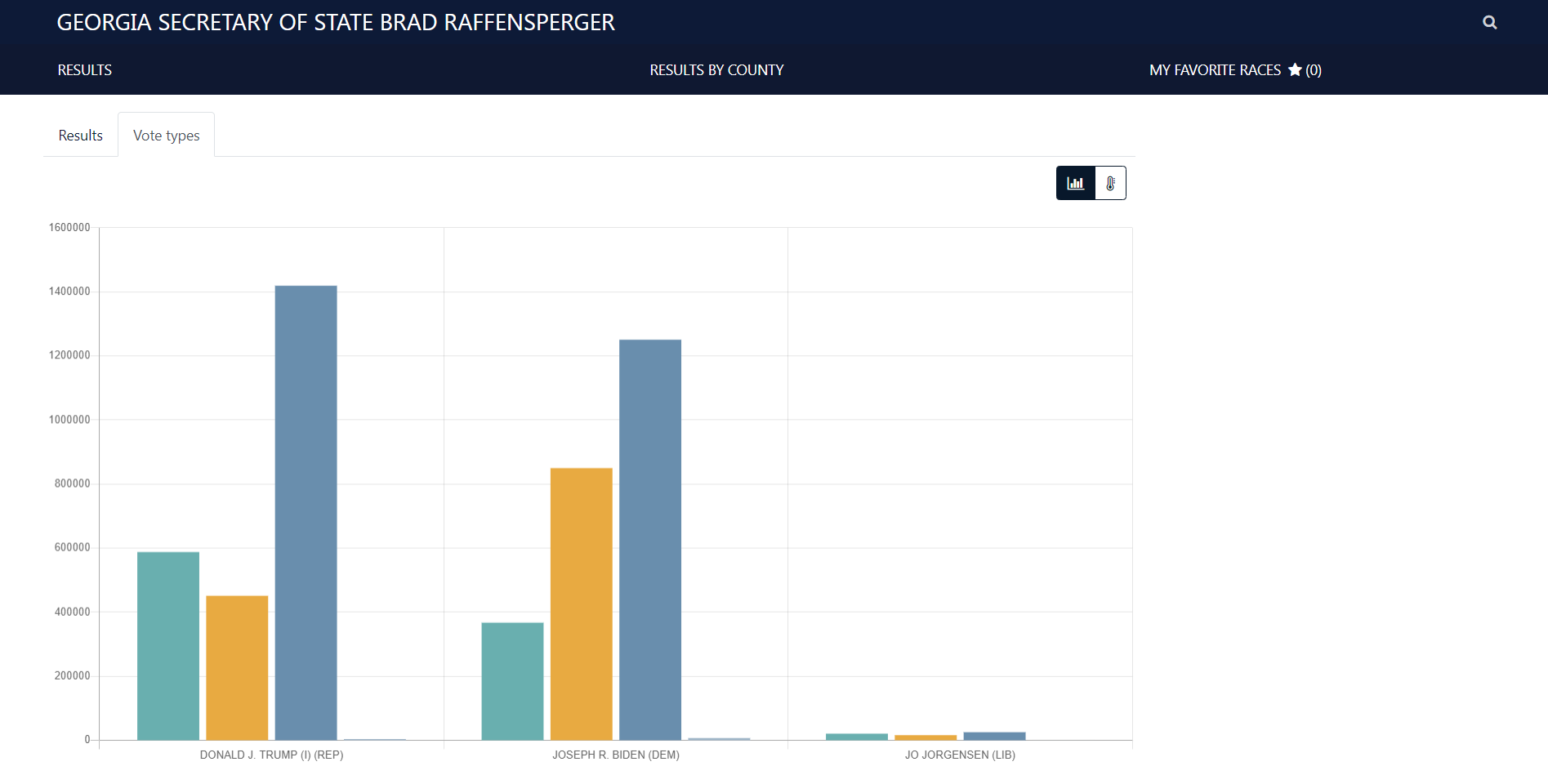The reason that President Trump lost in the state of Georgia, Secretary of State Brad Raffensperger is now claiming 16 months after the November 2020 general election, is that 28,000 Georgians skipped the race.
“The brutal truth is that 28,000 Georgians skipped the presidential race. And that’s why President Trump came up short,” Raffensperger said. Meanwhile, Georgians voted down ballot for state representative, state senator, congressman, but did not vote for anyone for president, according to Raffensperger’s latest claim, Rome News-Tribune reported.
Raffensperger, running for reelection as a candidate in the May 24 Republican primary, is making a series of speeches and town halls, according to the report, to address voters’ concerns about election integrity.
Clearing up disinformation about the 2020 presidential election is Raffensperger’s goal, according to reporting by Dalton Daily Citizen.
In addition to wanting to “set the record straight” about “what happened and what didn’t happen” during the 2020 election, Raffensperger apparently wants to console his fellow Republicans over the loss.
“I know that my party is grieving and I’m trying to help them get over that,” Forsyth County News reported.
In the past few weeks, Raffensperger has made many appearances including speaking at Dalton State College at a town hall forum hosted by the League of Women Voters from that area, the Rockmart Kiwanis Club’s regular meeting in Polk County, a North Forsyth-400 Rotary Club meeting and the Liberty County Chamber of Commerce during which he addressed the 2020 election.
In some of the news accounts on his talks, Raffensperger even reported that Republican congressmen got as many as 33,000 more votes than President Trump.
The Georgia Star News conducted an analysis of the 2020 general election data as reported on the Georgia Secretary of State’s office website.
Using the November 3, 2020, general election results that Raffensperger originally certified, the difference in Trump’s Republican votes of 2,461,837 and the total votes for all Republican congressional candidates of 2,490,396 is indeed 28,559 votes greater.
However, that simple comparison tells only a portion of the story, and is as much disinformation as Raffensperger alleges he is trying to clear up.
More than 73 percent of the 28,559-vote surplus of all Georgia’s congressmen over that of President Trump – or 20,946 votes – were absentee votes sent by mail or deposited into drop boxes.
Additionally, the Perdue U.S. Senate race is the only other one that had more Republican votes than Trump at a scant 780 in total. While Perdue had 8,692 less votes on Election Day, he received 7,271 more absentee votes by mail or drop box and 2,448 more advance in-person votes than Trump, netting the 780 total difference.
Meanwhile, Republican votes in five other major statewide races all fell short of the Republican votes when compared to those Trump received:
35,717 less Republican votes were cast in the Loeffler U.S. Senate race
46,539 less Republican votes were cast in the Public Service Commission District 4 race
16,656 less Republican votes were cast in the Public Service Commission District 1 race
42,556 less Republican votes were cast in the combined State Senate races
151,094 less Republican votes were cast in the combined State House races
More telling, like Perdue’s race, are the results as they relate to Republican absentee votes by mail or drop box as compared to votes for Trump:
Republican absentee votes in the Loeffler U.S. Senate race were 7,580 higher than Trump
Republican absentee votes in the Public Service Commission District 4 were 9,201 higher than Trump
Republican absentee votes in the Public Service Commission District 1 were 16,844 higher than Trump
Republican absentee votes in the combined State Senate races were 12,849 higher than Trump
Republican absentee votes in the combined State House races were 5,748 lower than Trump, but small compared to Election Day votes that were 41,158 lower than Trump and advanced in-person voting 101,979 lower than Trump.
Even more revealing is the difference in votes that Trump received in the state of Georgia in 2016 when he ran against Hillary Clinton versus the 2020 election against Joe Biden.
In the 2016 presidential election, Trump received 2,089,104 votes while he received 2,461,837 in 2020 or 372,733 more votes. The additional votes Trump received in 2020 over 2016 represents an increase of 17.8 percent.
Meanwhile, the November 3, 2020, results Raffensperger originally certified show that Biden’s votes in 2020 exceeded that of Clinton by 596,544 or an increase of 31.8 percent.
But, it’s the 2016 down-ballot election results that completely contradict Raffensperger’s recent claim that Republicans skipping the presidential race but voting down-ballot is the cause of Trump’s 2020 loss.
In all of the major down-ballot races during the November 2016 general election, votes cast for other Republicans far exceeded those cast for Trump.
46,702 more Republican votes were cast in Isakson’s U.S. Senate race
301,732 more Republican votes were cast in the Public Service Commission District 2 race
183,356 more Republican votes were cast in the combined U.S. House races
158,476 more Republican votes were cast in the combined State Senate races
149,950 more Republican votes were cast in the combined State House races
Still, Trump managed to defeat Democrat Clinton in Georgia by 211,141 votes, even while 2016 third-party candidate Gary Johnson had more than double the votes than 2020 third-party candidate Jo Jorgenson received in 2020.
The big difference in the 2020 versus 2016 election was, of course, the increased use of absentee voting by mail or by drop box, which went from 5.1 percent of the total votes cast for president in 2016 to 26.3 percent in 2020. Nearly all of that shift came at the cost of Election Day voting, which represented 41.2 percent of the presidential votes cast in 2016 and dropping to 19.5 percent in 2020.
While Trump bested Biden in the 2020 election on Election Day by 220,492 votes and advance in-person voting by 168,652 votes, the absentee vote difference of 398,572 combined with the provisional ballot difference of 3,242 Biden received is what Raffensperger used to certify the election for Biden.

This graph from the Georgia Secretary of State website depicting the results of the November 3, 2020, general election for the three candidates by vote type reveals that Trump won election day (first bar) and advanced in-person voting (third bar), but lost absentee votes by mail or drop box (second column).
Meanwhile, advance voting and provisional ballots represented nearly identical percentages in both election years. In 2016, advance in-person voting represented 53.5 percent of the total vote and 53.9 percent in 2020. Provisional ballots represented 0.2 percent of the total ballots in both 2016 and 2020.
Raffensperger enabled the use of absentee ballots – known to favor Democrats, The Star News reported – through a number of actions he undertook that were not approved by the General Assembly, which is the only entity Georgia’s constitution recognizes when it comes to authority over elections.
In a consent decree, Raffensperger conceded to Democrats by allowing curing of absentee ballots that would typically up being disqualified for problems, lowering standards for absentee ballot signature matching, making it more difficult to reject absentee ballots with signature issues and allowing Democrat control over election-worker training on signature matching.
Through an emergency rule of the State Election Board, which Raffensperger chaired at the time, the use of absentee ballot drop boxes by local elections administrators was permitted. In total, 120 of Georgia’s 159 counties installed drop boxes for the November 2020 general election.
The attempted controls through transfer forms used to document chain-of-custody of absentee ballots collected from drop boxes to delivery at the local elections office and the 24-hour video monitoring of the drop boxes required in the emergency rule have, instead of providing assurances of election integrity, revealed numerous issues and questions that remain unanswered by Raffensperger and his office.
The Star News has provided in-depth coverage on chain-of-custody issues surrounding absentee ballots deposited into drop boxes during the November 2020 election.
Additionally, The Star News reported, some counties including Fulton – Georgia’s largest – may not have retained the drop box video recordings from the November 2020 election, even as Raffensperger has said he is investigating illegal ballot-trafficking complaints submitted by election integrity group True the Vote.
Raffensperger also took it upon himself to mail absentee ballot applications to all of Georgia voters, which covered certain voters for the primary, general election and any election through the 2020 cycle with just one application.
Congressman Jody Hice (R-GA-10), is among three challenging Raffensperger in the May 24 Republican primary, called the Georgia voter file “grossly inaccurate” and said that mailing applications for the November 2020 election was a “horrible decision that majorly impacted our election process.”
In her revealing look at the November 2020 election, Rigged: How the Media, Big Tech and the Democrats Seized Our Elections number-one bestselling author Mollie Hemingway said that though issues with the November 2020 election in Georgia were numerous, few concerns raised by Republicans could get meaningful attention from Raffensperger’s office, The Star News reported.
“When Raffensperger did try to quell Republican discontent,” concluded Hemingway, “he often seemed to be more interested in protecting his reputation than addressing their concerns.”
– – –
Laura Baigert is a senior reporter for The Star News Network, where she covers stories for The Georgia Star News and The Tennessee Star.
Photo “Brad Raffensperger” by Brad Raffensperger.









the increased use of absentee voting by mail or by drop box, which went from 5.1 percent of the total votes cast for president in 2016 to 26.3.”
That says all you need to know.